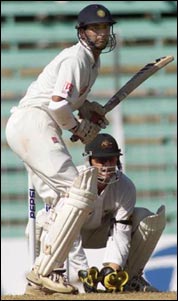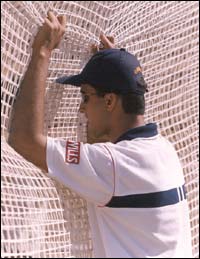 Home > Cricket > Diary archives
Home > Cricket > Diary archivesMarch 10, 2001
True lies, and other tales
Faisal Shariff
 Does someone have it in for the Indian team?
Does someone have it in for the Indian team?
True enough, fans en masse have reacted with disgust to the three-day thrashing at the hands of the Aussies, and critical stories were not only expected, but even mandated, after that dismal performance.
What strikes you as funny, though, is the seemingly concerted effort to paint the team in a shade of black deeper than what it perhaps deserves. Refer, for instance, to the tale that was given wide publicity in a section of the media.
The way it goes is, that this team was so lacking in interest that the members booked their flight tickets home on the morning of the third day itself. Got the tickets in hand while Sachin Tendulkar and Rahul Dravid were still batting in the middle. And headed for the airport within minutes of the loss.
That is not quite true, it turns out. The tickets were booked through the BCCI's travel agent, after the last wicket had fallen. As it turned out, Sadagopan Ramesh and Hemang Badani were the only ones who left that evening - because there were tickets available for the flight to Chennai. The rest left the next day, most of them in the morning, the rest later in the afternoon.
None of which takes away from the fact that while the Australians immediately booked in for more practise at the Wankhede, the Indians - who more than the tourists could have used some practise time - opted to fly back home to their families. Which is why I made the point that what makes you wonder is not the painting of the team black, but the attempt to give it an even darker shade than the team perhaps deserves. After all, there is a difference between booking flight tickets in the morning, while the game was on, and booking them in the evening, after the last ball was bowled.
"The whole story is untrue, and feels like a plant," says Professor Ratnakar Shetty, joint honorary secretary of the Mumbai Cricket Association, dismissively.
Autograph-Hunters are an amazing breed. Apparently, like the other kind of hunter who goes out with a rifle intent on slaughter, the autograph hunter is more intent on adding scalps to his belt, than in the actual game. Thus, it was a rather strange sight to see the Indian players, as they walked out of the Wankhede after that humiliating defeat, mobbed by hordes of signature-seekers.
The funny part of this is, that the players - and their sponsors -- for their part see this as a reaffirmation of their popularity, a reconfirmation that defeat and victory really means zip to the cricket fan. And this provides the players a comfort zone, in which they bask and within which they seek refuge from the cold of condemnation and censure.
Players as prima donnas are quite the norm, for Indian cricket - but since when did that extend to the team managers as well? Chetan Chauhan, politician and manager of the Indian team now battling against Australia, is an example of what I mean. No sooner had Chauhan landed in Bombay, than he categorically informed the Mumbai Cricket Association that he had no intention of traveling with the players, in the team coach. And insisted that a 1000cc Maruti Esteem coupe be hired for his use - at Rs 1,800 per day - for the duration of his stay.
The behaviour is strange. It is, in fact, doubly strange given that Chauhan was once a Test cricketer himself, and therefore should have been more tuned to the feelings of the team.
No sooner had Chauhan landed in Bombay, than he categorically informed the Mumbai Cricket Association that he had no intention of traveling with the players, in the team coach. And insisted that a 1000cc Maruti Esteem coupe be hired for his use - at Rs 1,800 per day - for the duration of his stay.
The behaviour is strange. It is, in fact, doubly strange given that Chauhan was once a Test cricketer himself, and therefore should have been more tuned to the feelings of the team.
It is perhaps for this reason that his presence is greeted with indifference, bordering on contempt, by the team members. Vide the occasion when Saurav Ganguly and Wankhede curator Nadeem Memon were discussing the wicket, the weekend before the Test, and Chauhan walked out and added his own two-bits. 'Mind your own business, I am the captain and will decide what to do,' Ganguly shot back, leaving a visibly chastened Chauhan to slink away. IF the manager's ways were curious, that of the BCCI's official observer were curioser.
The observer, in effect, is someone in good standing with the Board, who gets to tag along, ostensibly to perform myriad duties. In fact, those duties consist of distributing BCCI passes to favoured souls, checking that the staging association reimburses the guarantee money to the BCCI, and ensuring that the needs of the official sponsor, Pepsi, are fulfilled as laid down in the agreement.
For the Wankhede Test, the observer was Raju Madkholkar, Hon. Secretary of the Vidarbha Cricket Association. Unfortunately, he only made it to the Bombay on the first evening of the Test, and even then was, shall we say, in no condition to do any work. He was sent back home the next morning.
And for this, he received a total of Rs 37,000 - Rs 4000 for each day that he was theoretically on duty, for a total of eight days, plus an additional 5000 rupees as incidental allowance. Not to forget the airfare from Nagpur to Bombay and back.
It's a nice job, if you can get it. And you can get it, if you are in the 'nice' books of the BCCI.
IF disgusted MCA officials - who are in fact contemplating making a formal complaint to the BCCI - are to be believed, Indian skipper Saurav Ganguly should not be allowed anywhere near a wicket under preparation.
 "The whole problem with the Wankhede wicket was caused by Saurav's interference," says an official. "Normally the captain arrives at the ground about two days before the start of the game, and invariably requests that the green be shaved off. The problem was that Saurav came here earlier, and interfered with the curator's job."
"The whole problem with the Wankhede wicket was caused by Saurav's interference," says an official. "Normally the captain arrives at the ground about two days before the start of the game, and invariably requests that the green be shaved off. The problem was that Saurav came here earlier, and interfered with the curator's job."
What exactly was the problem? "He was against having any grass on the wicket," comes the response. "Fair enough, most of the previous captains have done exactly that, though they all talk of the need for India to have good wickets at home. But Saurav went beyond that, and refused to let the pitch be rolled, with either the light or heavy roller. What's the point? If you remove the grass completely and don't let the roller onto the track, how then will the binding stay? The wicket will get dusty. It seems that is what Saurav wanted - a dusty wicket with no watering and rolling, one that would turn from day one. Fine, he got the wicket he wanted, it was turning on the first morning - and what happened? It was our own batting that was exposed, not that of the opposition."
Though curator Memon refutes the allegation, the Australians - despite winning with plenty to spare - did complain that the Wankhede wicket was not up to Test class. And it is learnt that ICC match referee Cammie Smith has submitted a less than favourable report to the ICC about the nature of the wicket. And that brings with it a danger - following various changes in rules, the ICC has now empowered itself to examine such reports and, if it believes that there is just cause, to impose temporary, or even permanent, bans on such venues.
"Why not leave pitch preparation to those who are paid to do the job, instead of interfering in things you know nothing about and getting us all a bad name," grouses one MCA official.
For his part, Nadeem Memon says there was nothing wrong with the pitch, and points out that two Australian batsmen got centuries, while one Indian batsman batted without a care in the world in both innings on the selfsame track. "Arrey, the wicket was fine," Memon says. "There are other factors too, in cricket - field placement bhi to ana chahiye na?" (One must know what field placements are all about).
Cricket correspondent Faisal Shariff was rushing to office to file this diary, immediately after
the Wankhede Test ended, when he tripped and tore a ligament in his heel. Attending doctors opine
that anger and grief over India's rapid capitulation had something to do with the injury. In any case,
it took him - and the story - a further six days to limp over to our office and get posted. Sorry for
the delay - and anyone wishing to send flowers and healing balm to the walking wounded can do so
care of rediff.com
©1996 to 2001 rediff.com India Limited. All Rights Reserved.